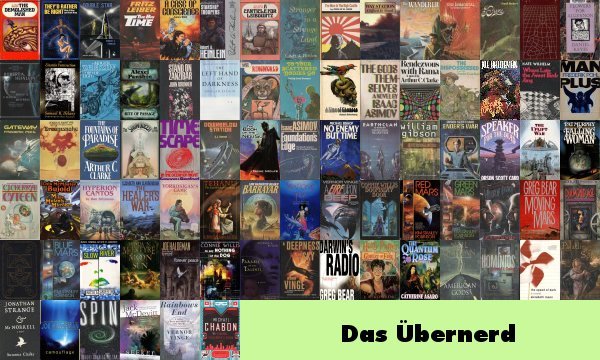 A Deepness in the Skyby Vernor Vinge2000 Hugo Winner for Best Novel
A Deepness in the Skyby Vernor Vinge2000 Hugo Winner for Best NovelVinge's first Hugo winning novel
A Fire Upon the Deep took his knowledge of network technology and painted a whole universe with it. Everything down to the aliens were reflections of certain basic technological problems.
A Deepness in the Sky is a sequel of sorts but this time it lacks the strong central theme. The result is an interesting space opera but not one that feels as impressive as its prequel.
Deepness takes place thousands of years before
Fire at a point where humanity is expanding from Earth on slower than light ships. They've yet to cross the boundary into to zone toward the edge of the galaxy where magical technologies become possible since once it has been found it starts an inevitable migration out to the edge. Pham Nuwen, one of the protagonists from Fire, rebuilt the divergent, distant colony worlds into one civilization with trade and conquest but was betrayed by his lover at the moment of his declaration of an interstellar empire. He went into hiding for millennia thanks to relativistic travel and longevity treatments and now his descendants have sought him out to make reparations and gain his assistance on a trip to a star where there's a sign of a non-human civilization.
The star is called OnOff since it flares to brightness for a few decades every few centuries before gradually dimming again. A strange species has built a culture around surviving these cycles, rebuilding themselves from almost nothing and then hibernating deep below the surface as their world freezes over again.
Shortly after arriving the traders encounter another interstellar human civilization, this one fascist. A battle ensues which devastates both fleets leaving them incapable of interstellar flight but the traders completely without leadership. The senior officer they have left is a young man on his first voyage whose family owned a share of the fleet. The fascists still have weapons and so an uneasy peace is built with them on top with both trying to last long enough to uplift the alien civilization to a state where it could help them. As the decades pass rebellions occur, war threatens the planet below, technology threatens to turn the traders into monomaniacal slaves, and in the background Pham plots a slow revenge on all sides and using the new technologies to build an empire that will last.
I can't help but notice that I need a lot more room to explain a Vinge plot; it doesn't feel like that when you're reading it but one of the interesting things about many of his books are when he puts together so many high concept ideas and sees how they interact. That may be Deepness's single biggest weakness since it doesn't feel like it has a particular guiding theme. You have three conflicting cultures influencing each other, nanotechnology and distributed processing, and human interaction as a filtering process. It feels like Vinge threw every interesting idea he could get his hands on in the book and it makes the whole thing feel unfocused.
There is a lot in the book about perpetuating culture across great distances and if I had to pick out a single biggest concept. The aliens have to try to retain their culture in the face of destruction every few decades, Pham wants to create a common culture that links humanity despite decades of distance between them, and the two co-existing human cultures try to keep their way of life in the face of a radically different culture and distance.
Once more Vinge's aliens are much more interesting than the humans. The species of OnOff is presented in human terms but at the same time feeling slightly off. The intention is that the sequences featuring them are a loose translation. At the same time the humans are fairly shallow. The fascists are your standard evil manipulators while the traders are clearly the good guys. Their leaders is the idealist put in a bad situation and they are complete with a naive young girl who is being taken advantage of.
One thing that Vinge throws into the novel that I have to single out for notice is the concept of "Focus", a technique the fascists use to initiate a permanent state of monomania on a person so that they can use them as living processors. The obsessions make the victims effective and fragile at the same time in their areas of expertise while reducing the victim to a de facto slave. Their world view becomes microscopically tight and Vinge delves into the psychology of such a mania in a way that is very interesting. In a way it's a method of keeping those characters two dimensional but at the same time turning the humans to aliens.
A nice thing about
Deepness is that it is not necessary to read Fire to enjoy it. While knowing about the zones of thought and transcendent technology casts OnOff in a different light there isn't any heavy handed foreshadowing or even playing around with sequences that would make sense only in context of the series.
Deepness can stand completely on its own.
The lack of a strong focus makes
A Deepness in the Sky the weakest of Vinge's Hugo winners but that doesn't make it a bad book by any stretch. It's a very entertaining space opera with a lot of fascinating concepts thrown about which makes me recommend it. I just happen to enjoy many of Vinge's other works better.
 Raiders of the Lost Ark
Raiders of the Lost Ark 





